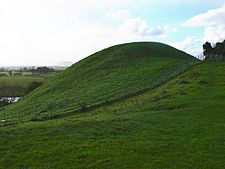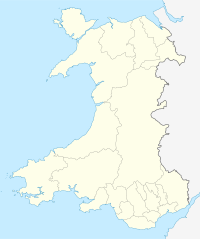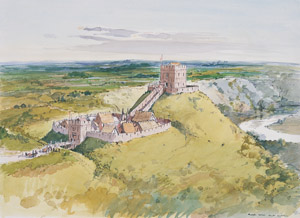Twthill, Rhuddlan facts for kids
Quick facts for kids Twthill Castle |
|
|---|---|
| Rhuddlan, Denbighshire, Wales | |

Twthill Castle
|
|
| Coordinates | 53°17′11″N 3°27′45″W / 53.2864°N 3.4625°W |
| Type | Motte and bailey |
| Site information | |
| Owner | Cadw |
| Open to the public |
Yes |
| Condition | Earthworks remain |
Twthill (Welsh: Twtil) is an old Norman castle in Wales. It's near the town of Rhuddlan in Denbighshire. People also called it Toothill, Tot Hill Castle, or Old Rhuddlan Castle. This castle was a "motte and bailey" type. This means it had a big earth mound (the motte) and a walled area (the bailey). Later, a much bigger stone castle, Rhuddlan Castle, was built nearby. Today, you can still see the large mound of Twthill. You can also see hints of where its old walls used to be.
History of Twthill Castle
Twthill Castle was built in 1073. A Norman lord named Robert of Rhuddlan built it. He was related to Hugh d'Avranches, Earl of Chester. The castle's purpose was to help the Normans take control of North Wales. This was ordered by William the Conqueror, the King of England.
From this castle, Robert of Rhuddlan took control of much of North Wales. A small town grew up next to the castle. By 1086, this town had eighteen burgesses, who were like important citizens. It also had a church and even a place to make coins, called a mint. You can find coins made in Rhuddlan from this time in museums today.
This motte and bailey castle was used for about 200 years. Then, King Edward I ordered a new, stronger castle to be built. This new castle, Rhuddlan Castle, was built right next to Twthill. Some stories say that Twthill Castle was built on the spot of a palace. This palace belonged to Gruffydd ap Llywelyn, who was a king of Wales.
What Remains of Twthill Castle Today
Twthill Castle is about 300 yards south of the stone-built Rhuddlan Castle. Today, only the motte, which is the large earth mound, remains. This mound is about 12 meters (39 feet) high. It is also about 80 meters (262 feet) wide at its base. You can still see faint outlines of the bailey in the fields around it. The sandy soil has caused much of the site to wear away over time.
Cadw, a Welsh government group, now looks after Twthill. It is open to the public all year round. There is no charge to visit. You can reach the castle by walking about 400 meters (1,300 feet) across farmland.
 | Emma Amos |
 | Edward Mitchell Bannister |
 | Larry D. Alexander |
 | Ernie Barnes |



